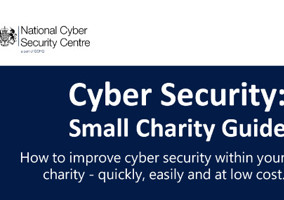Our monthly round-up of the latest technology developments and partnerships affecting the charity sector.
In case you missed it: News highlights
The second Charity Digital Skills report was published this month. If found that a “worrying lack of progress” had been made since the first survey was carried out. Read the full story.
Following the death of Stephen Hawking the Motor Neurone Disease Association's website stopped working due to the “huge increase” in the number of people looking for information. Read the full story.
The Information Commissioner’s Office published its latest update on data security breaches, which shows that in 2017 charities accounted for 110 or just 4 per cent of total breaches reported to the ICO. Read full story.
The National Cyber Security Centre (NCSC), which is part of GCHQ, has published an assessment of the cyber threat to charities and a guide to help the sector minimise the risks. In its assessment of the charity sector, the NCSC said there is “considerable variation in charities’ understanding, approach to and application of" cybercrime. Read full story.
A European charity has successfully used blockchain technology to transfer €5,000 to one of its country offices without going via a traditional bank but instead using Disberse - a platform using blockchain technology. The NGO is part of the Start Network, which is a 42-strong coalition of international aid organisations who will pilot a number of ideas with Disberse over the course of the next year. Read the full story.
Latest partnerships
WWF and Exponential-e: connectivity improvement
WWF worked with Exponential-e to improve its internet connectivity. The charity has stopped using traditional telephone services, relying instead of real-time video conferencing and similar services, but the internet bandwidth could not support all the requirements. This meant that some employees were not using the tools, which was restricting communication between the head office in Surrey and its satellite offices in Cardiff and Edinburgh.
Paul Beyer, network manager at WWF said: "We underestimated just how embedded internet‐based services and tools had become in our operations and as a result, the network simply wasn't able to keep pace with what the business needed.” This meant that “employees were frustrated, productivity was faltering and inter-office connectivity was practically non‐existent".
Epilepsy Action and m-hance: CRM project
Epilepsy Action has chosen to work with m-hance on a customer-relationship management project and roll out m-hance’s charity CRM solution, NfP 365. The charity wanted to improve its IT system integration and wanted a new system that could support its ambition to grow. It also wanted better reporting capabilities and to make sure it was prepared for upcoming legislative changes as GDPR comes into effect.
After an invitation to tender, Epilepsy Action shortlisted three providers and obtained customer references. Simon Wigglesworth, deputy chief executive, said: “We are really looking forward to rolling the system out to our staff. Most importantly, being able to build personalised campaigns and messages for our supporters will mean we can engage with them in different and more meaningful ways, as well as improving our marketing capabilities.”
Sue Ryder and K3 Retail: Retail software
Sue Ryder has completed the roll-out of new electronic-point-of-sale software from K3 Retail in its 450 charity shops. The new software will enable better communication between shops and departments so there is more clarity around pricing and stock levels.
David Borrett, director of retail, marketing and communications, said: “We know that the charity retail sector adds value to local communities across a range of environmental, social and economic impact areas, including supporting volunteers, and reducing annual carbon emissions through recycling and re-use. If we’re going to perform well and push a store’s performance we need the vital information that the new system will provide to move forward."
Blind Veterans UK and Totalmobile: Mobile working
Blind Veterans UK plans to adopt mobile working technology from Totalmobile. It hopes to save time and reduce administration and increase the number of home visits it makes because staff will not need to return to the office to fill out forms.
Umesh Parekh, head of information services, said: “Our team will now be able to use mobile devices to capture and submit information during assessments and access information on the move in a way that they wouldn’t have been able to before. This will significantly reduce the amount of administration and travel required, meaning that our team can spend more time actually providing services to the blind veterans we support and reducing the time those in need have to wait.”
JustGiving and RoosterMoney: Encouraging children to donate
RoosterMoney, which is an app that has been developed to teach children about money with spending, saving and giving pots, has partnered with the fundraising platform JustGiving to encourage children to donate to charities.
From Charity Finance magazine
Insights
To coincide with Open Data Day this year, Rachel Rank, chief executive of 360Giving wrote a piece explaining why charities cannot ignore the trend. Read the article.
How CAST and Breast Cancer Care shared their learning from developing a new app to support women with breast cancer. Read the article.
With uncertainty over the future of copper coins Kirsty Weakley looked at how digital technology was already giving charities new ways to collect small change and what the barriers were to scaling this up. Read the article.
|
Related articles












